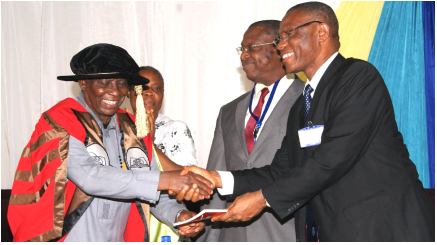FEATURED NEWS
Emenanjo Links Dev To Language, Culture At Valedictory Lecture
- Details
- Published: 09 April 2013

If Nigerians are really serious about transforming their country from a pre-industrial to a post-industrial one, they must shift their paradigms to Asian and Brazilian models, where the culture of development is integrated with the development of culture.
Foremost Linguist, Professor 'Nolue Emenanjo, who made the observation while delivering the 4th Valedictory Lecture of the University last Thursday, at the Ebitimi Banigo Auditorium, added that “If we are really serious about transforming Nigeria from a third-and-last-world to a first, achieving the MDGs by 2015 and producing and sustaining capital: human, industrial, social, and enduring structures, our only choice is to dispense fundamental education through literacy in Nigerian Languages.”
Emenanjo, whose Lecture was titled, “About Language: Can Confucius Be Right”, noted that “development is first, about people and then, about capital and structures. It involves a change for the better in human, cultural, socio-economic and political conditions of the individual, and consequently, the society.”
Describing Confucius as a 5th-6th century Chinese Philosopher, who embodied the quintessence of Chinese philosophy, culture, knowledge, education, religious beliefs and practices, Emenanjo disclosed that the Chinese philosopher once said that if given the opportunity to become the president of China his priority would be to: “correct language, if language is not correct, what is said is not what is meant. If what is said is not what is meant; what ought to be done remains undone and the people will stand in confusion.
Emenanjo, who stated that “About Language: Confucius is right,” said: culture is central to human capital, leadership, entrepreneurship, policy choice, institutions, regretting that “With the collapse of culture, condemnable vices have become commendable virtues. Condemned, certified and proven sinners have become the confirmed and canonized saints, in all domains. The area boys and girls have become the beatified national saints, the grandmasters, and beautiful brides of national politics and recipients of Nigeria's national honours, recognitions and medals.”
On his contributions to language development, Emenanjo, who was a one-time Provost, College of Education, Warri said: “I set up the Department of Nigerian Languages for teaching and producing teachers in the languages of the immediate environment—Itsekiri, Urhobo, Isoko and Izon. That Department still survives there. Indeed, I made time to teach some of the linguistic and practical courses at Warri”.
He disclosed that as Executive Director of the National Institute for Nigerian Languages (NINL), Aba, “I had the whole of Nigeria and her languages to practise as a language engineer. Working with native speakers, we developed or systematized the orthographies of many Nigerian languages and got native speakers to write structured and graded school texts in their languages. We also developed curricula and trained manpower for quite a good number of Nigerian languages.”
He noted that mentoring, counselling and shepherding constitute an academic trinity which ensures the continuity and survival of academic legacy, stating that “Any senior academic who is not interested in this and is not doing it, is in the wrong place.”
Reacting to the Lecture, Vice-Chancellor, Professor Joseph Ajienka who observed that a Valedictory Lecture offers the Valedictorian an opportunity to speak his mind on a number of issues, said: “Any society that has a linguist like Professor Emenanjo, who can develop language and give it depth has something great that it must cherish”.
In his contribution, Dean Faculty of Humanities, Professor Ozo-mekuri Ndimele, who described the Valedictory Lecturer as his Supervisor and academic father, disclosed that he also had a mother in the late Professor Kay Williamsons. The Dean said that he would sorely miss Professor Emenanjo, as would the Department of Linguistics and Communication Studies, the Faculty of Humanities and the entire University.
By Humphrey Ogu

